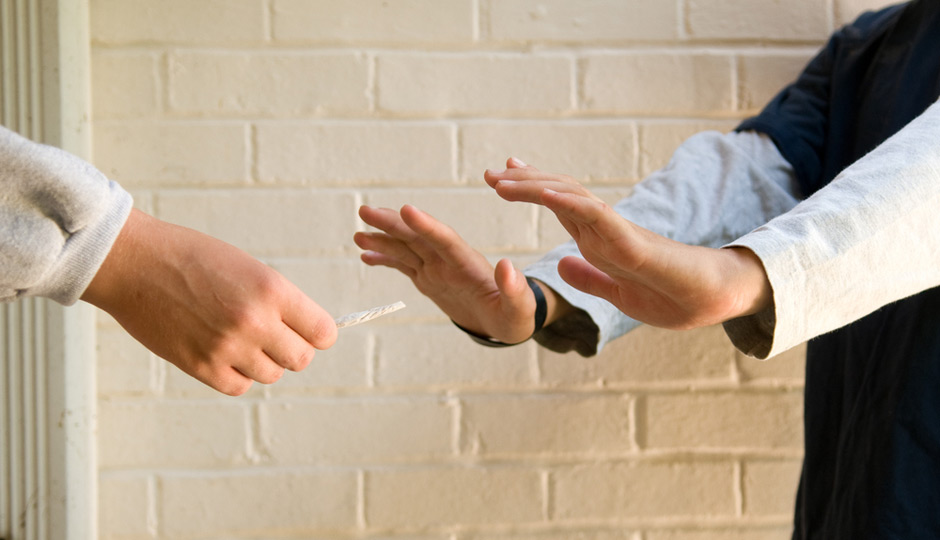What Do You Tell Kids When Pot Is Suddenly Legal?

Photo | Shutterstock.com
On New Year’s Day, the New York Times’s Jack Healy tweeted a tender family portrait of a father and son who had trekked all the way from Georgia to Colorado (sleeping in their van!) to be among the first legal par-tokers of marijuana now that recreational use of the drug is permitted there. I showed the tweet to my son Jake, who was home from college for the holidays, and his immediate response was to ask my husband Doug why the two of them hadn’t taken such a road trip.
This father and son from Georgia slept in their van to be here as #Colorado sells its first recreational pot pic.twitter.com/QImu0CWQ0l
— jack healy (@jackhealyNYT) January 1, 2014
It’s been 77 years since pot was last legal in the US of A, which means no parent I know has experience in explaining to his or her offspring why one day a drug is illegal and sure to lead to a lifetime of penurious depravity and the next is okay for one and all. For those of us who came of age during the War on Drugs, it’s … well, weird to contemplate sharing a bowl with the kids. (Remember that “This is your brain. This is your brain on drugs” fried-egg ad? Yeah.) It’s not so much that I think marijuana is the devil’s weed. It’s that buying your kid his first legal drink, which I recently did with Jake (he opted for a martini, and regretted it), is strange enough. Stephen Pasierb, president of the Partnership at Drugfree.org, recently told Fox News that conversations between parents and kids about drugs have become “extraordinarily complicated” in the wake of changing marijuana laws.
In Colorado, a recent report on Denver’s 9News.com looked at how schools are approaching the subject. “Students, when they hear something was legalized, I think they may have a propensity to think that now it’s acceptable,” Westminster High School principal Mike Lynch says. Adds Chris Harms, director of the Colorado School Safety Resource Center, “We want students to know that it’s not only illegal, but extremely harmful for them to be using” marijuana, which remains banned for those under 21.
But sensible as that seems, complications can arise. In Oregon, a mom who legally used pot for a medical condition had some explaining to do when her 8-year-old son burst into tears during a classroom discussion on the drug and confessed to school authorities that his mom was a user. The mom, Serra Frank, started a Facebook page, called Moms for Marijuana, to get advice from other users about talking to kids.
There appears to be reason for concern about underage use in Colorado; a 2013 report by the federal Drug Enforcement Administration and Denver’s Office of Drug Strategy showed that while nationwide, 6.5 percent of eighth-graders have used pot, in Denver 18 percent have.
It seems logical to treat marijuana the way we’ve treated alcohol as a society — stressing that it’s just for adults, talking about smart choices and avoiding smoking and driving. You can be arrested in Colorado for operating a vehicle with more than five nanograms of THC per milliliter of blood. Cops can pull you over if they suspect you’re impaired; they’re getting special training. Chris Harms wants a campaign warning parents not to smoke around kids even if the parents are using it legally.
Lynch says that even before legalization, schools were seeing marijuana use rise. Teachers and staff are trained to look for classic signs that kids have been smoking pot, but the principal says the fact they may be ingesting it instead of smoking it — sales of marijuana-laced food are also legal now — makes detection harder: “That’s a game changer.”
The legal pot market in Washington State is expected to be up and running come June; legalization efforts are under way in other states including Alaska, Oregon and California. With medical use of marijuana already legal in 20 states and the District of Columbia, the wave of the future seems pretty clear. For a lot of boomers, pot use has always been a sort of joke — ha-ha, look who’s high! But that joke looks different when it’s your kid lighting up, the same way a martini does when your son drinks it. This is uncharted territory. It makes me wish I could ask my grandmother, God rest her, what she told her seven kids when Prohibition got repealed back in 1933.
Follow @SandyHingston on Twitter.


